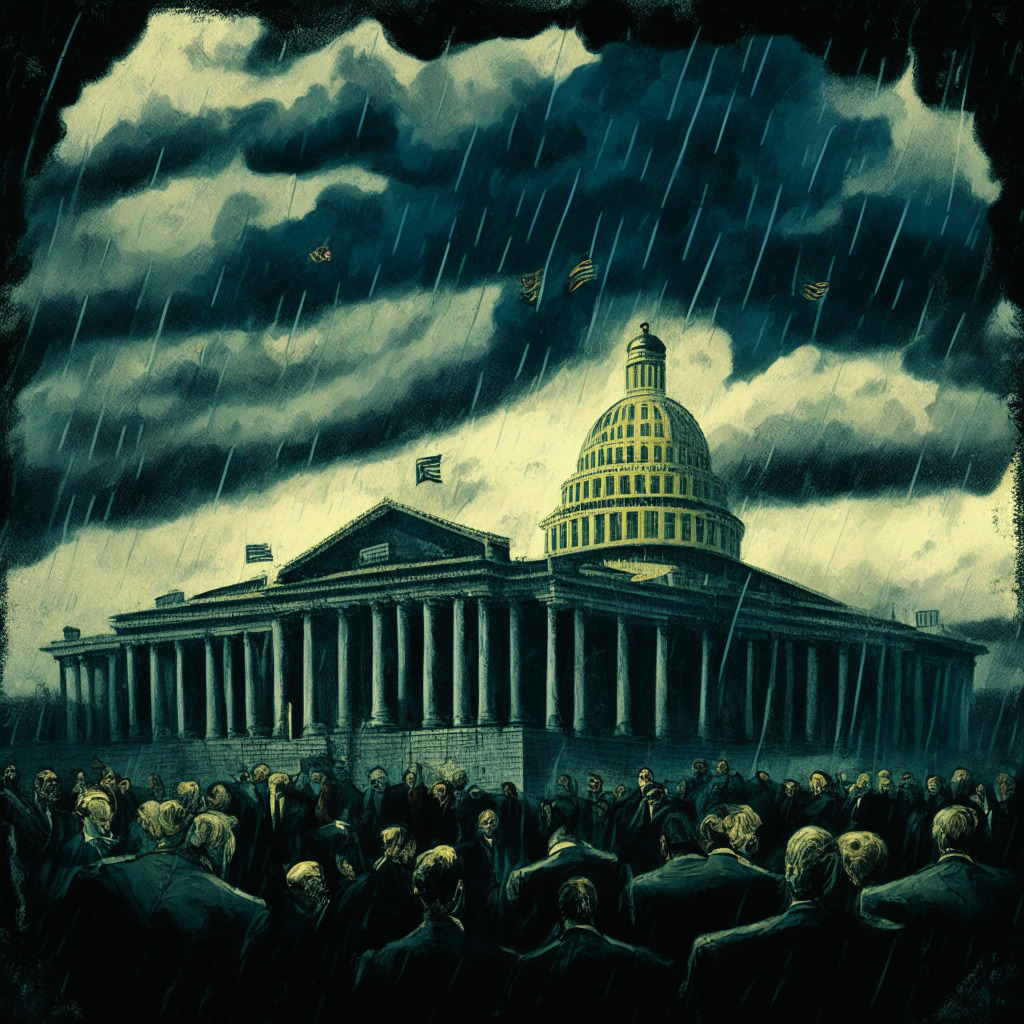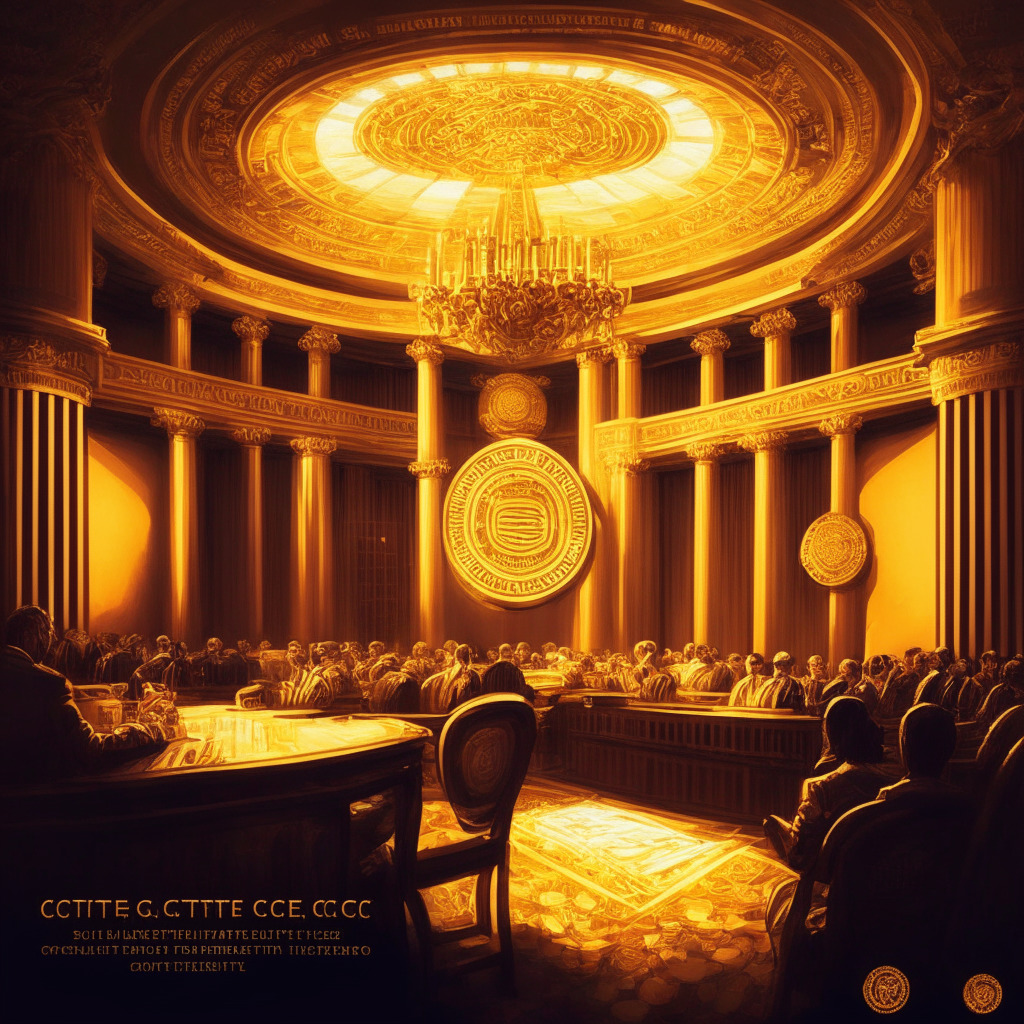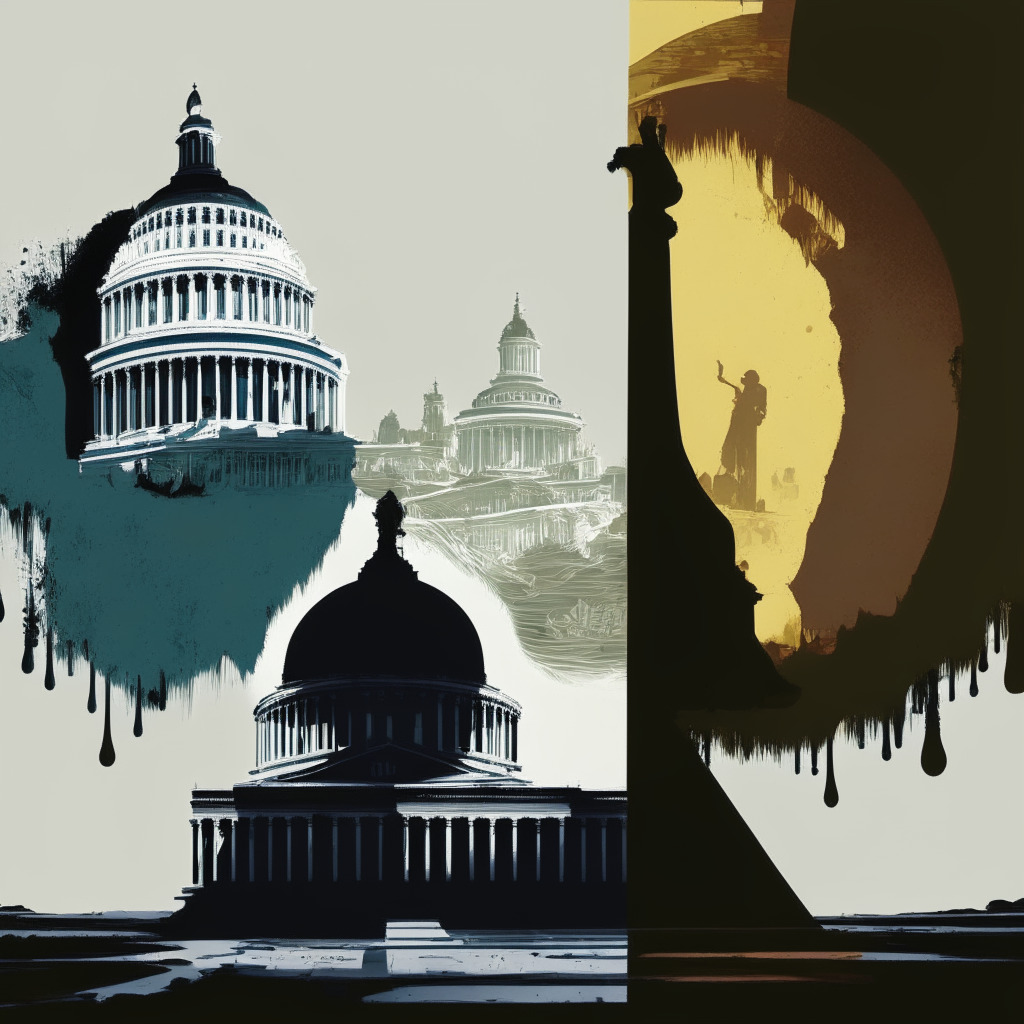Financial Services Committee Chairman Patrick McHenry indirectly supports BlackRock iShares spot Bitcoin ETF and criticizes the SEC’s regulation approach to the digital asset market. The upcoming hearings and committee vote on a digital asset bill may impact the crypto market, clarifying regulations and jurisdiction between the SEC and CFTC.
Search Results for: Patrick T. McHenry
Digital Asset Market Structure Draft: Striking the Balance Between Regulation and Growth
US House Financial Services Committee Chair Patrick T. McHenry announced a vote on the Digital Asset Market Structure Discussion Draft to classify cryptocurrencies as securities or commodities and regulate exchanges. However, concerns arise due to potential “provisional registration” that could reward bad actors in the industry with a “get out of jail free card.”
Federal Reserve’s Tightened Grip on Crypto Sparks Republican Lawmakers’ Concerns
Republican lawmakers express concerns over the Federal Reserve’s intensified oversight on crypto and stablecoin activities, arguing it might block the progress of a legislative proposal aimed at regulating stablecoins. Lawmakers believe the increased scrutiny might dissuade financial institutions from entering the digital asset ecosystem.
SEC’s Controversial Rule Sparks Debate: Impact on Digital Asset Industry and Struggle for Balance
A group of Republican lawmakers criticized a proposed SEC rule, arguing it could shut down the digital asset industry’s development. They expressed concerns that the rule, potentially expanding the definition of an exchange, would capture various individuals, including software developers and blockchain network participants. The controversy highlights the growing consensus on the necessity of a clear legal framework within the cryptocurrency space.
Bipartisan Efforts for Clear Digital Asset Regulations: Can SEC and CFTC Find Common Ground?
Two Republican lawmakers from the US House Financial Services Committee and the House Agriculture Committee are working on a discussion draft to regulate digital assets, aiming to establish clarity in determining when a digital asset is considered a security. The draft legislation, “Digital Asset Market Structure Discussion Draft,” proposes a process for treating digital assets and seeks a unified path for SEC and CFTC jurisdictions.
Digital Asset Regulation: Bridging the Divide Between CFTC and SEC in Upcoming Congressional Hearing
US lawmakers will discuss “The Future of Digital Assets: Providing Clarity for Digital Asset Spot Markets” in a congressional hearing on June 6. Collaboration between regulatory committees like the CFTC and SEC is essential to address concerns in the digital assets space, focusing on effective guidelines and fostering innovation while safeguarding consumer interests.
Biden’s 30% Crypto Mining Tax: Innovation Killer or Eco-Friendly Move? Pros & Cons Explored
Senator Cynthia Lummis opposes the proposed 30% tax on cryptocurrency miners in the Biden Administration’s budget for 2024, citing environmental benefits. The proposed tax has sparked debates surrounding innovation, blockchain development, and consumer protection, with concerns it may hinder cryptocurrency adoption in the US.
Stablecoin Regulation: Balancing Innovation and Consumer Protection in the US Market
California Rep. Maxine Waters has introduced a draft bill to regulate stablecoins in the United States, focusing on payment stablecoin issuers’ requirements, digital dollar research, and related subjects. Supporters say a clear regulatory framework would ensure oversight and consumer protection, while critics argue it could hinder innovation and limit the broader adoption of cryptocurrencies.
Tether’s 15% Bitcoin Investment: Pros, Cons, and Future of Stablecoin Regulation
Tether plans to invest 15% of its net profits in Bitcoin to strengthen and diversify its reserves, demonstrating the company’s confidence in the cryptocurrency market. As US lawmakers discuss potential stablecoin legislation, Tether’s bold move could potentially shape the future of the industry.
SEC’s Crypto Transparency Under Fire: Will Gensler Meet Committee’s Deadline?
The House Financial Services Committee accuses SEC Chair Gary Gensler of avoiding requests for information on cryptocurrency-related matters, resulting in threats of a hearing. Committee members demand clarification on digital asset exchanges registration and whether ether is a security or commodity. Regulatory clarity and open communication are crucial for the growing crypto market.
Ripple Effect: The Rise of XRP and The Advent of Meme Kombat in Crypto Markets
“The surge in XRP’s value, a solid 4.5% gain in 24 hours, has aroused excitement in the crypto world. With an overall increase of 57% since the year’s start, there are expectations for more gains. A recent market recovery and technical indicators validate this positive trend, all pointing towards XRP’s potential breakout.”
Navigating Uncharted Crypto Waters: The Impact of New House Leadership on Digital Asset Regulation
“A staunch crypto advocate, Representative Patrick McHenry, has provisionally stepped into the role of US House Speaker. McHenry has shown appreciation for the significance of American innovation and advocated for stablecoin regulation. These transitions bring opportunities and challenges for digital currencies and their regulation.”
Navigating the Regulatory Maze: Driving Stablecoin Legislation Under Biden’s Administration
Chair Patrick McHenry of the US House of Representatives’ Financial Services Committee affirms his commitment to regulate stablecoins. He steers two digital asset bills targeted at stablecoin regulation, and bringing clarity to the role between the CFTC and SEC. McHenry highlights potential bipartisan support and the global influence of dollar-denominated stablecoins, emphasizing complex power dynamics beyond the digital asset scope.
Crypto Regulatory Suspense: SEC’s Stance, Stakeholder Worries, and an Uncertain Future
“The U.S. House Financial Services Committee may subpoena the SEC over undisclosed documents related to FTX’s former CEO. The Committee claims the SEC’s lack of cooperation is compromising transparency and hindering digital asset ecosystem growth. This case demonstrates how regulatory bodies are scrutinizing the digital asset industry.”
The Bitcoin Market Quandary: An Era of Opportunities Amid Regulatory Tensions
“As Bitcoin’s price slips by over 4%, a significant opportunity emerges with a court ruling in favor of Grayscale. This decision could inspire a surge in cryptocurrency innovation across the United States. However, the unfolding narrative around regulatory frameworks is shaping market sentiment and raising concerns about future regulations, potentially hindering growth.”
Grayscale’s Victory Stirs Up Controversy: Doubts Over SEC’s Gensler Heighten
“Cryptocurrency circles discuss Grayscale’s lawsuit and SEC chair Gary Gensler’s role. Congressman Warren Davidson suggests Gensler’s SEC decisions lack stead, as demonstrated by Grayscale’s legal victory. This opens up possibilities for a Bitcoin spot ETF emergence in the US, but the situation remains uncertain.”
Navigating the Regulatory Labyrinth: New Rules and Fluctuating Tides in Crypto Sphere
“The United States Internal Revenue Service (IRS) is proposing new tax policies for the sale/exchange of digital assets by brokers, attracting criticism from crypto figures. Meanwhile, Gemini, a cryptocurrency exchange, faces a SEC lawsuit on potential regulatory violations. These developments reflect the ongoing struggle to balance regulation with innovation in the emerging field of cryptocurrency.”
Unraveling the IRS Draft on Digital Asset Reporting: A Regulatory Leap or Misguided Move?
The US IRS has issued draft guidelines on reporting rules for digital asset brokers. Aimed at regulating the digital asset industry, this regulation intends to streamline tax reporting and prevent fraud, proposing to raise $28 billion in fresh tax over a decade. Critics label it as “misguided” and “an attack on the digital asset ecosystem.”
The Clash Over PayPal’s Stablecoin: Balancing Innovation and Regulation
“The U.S. House Financial Services Committee offers contrasting viewpoints on PayPal’s U.S. dollar-pegged stablecoin, PYUSD. While Rep. Maxine Waters expresses concern about regulatory oversight, Rep. Patrick McHenry proposes potential in its development. The struggle between fostering innovation and ensuring safety shows the complex challenges of the crypto industry.”
PayPal’s PYUSD: Stepping Stone or Stumbling Block for Blockchain’s Future?
“The recent launch of PayPal’s dollar-backed stablecoin, PYUSD, has incited controversy due to the lack of Federal regulation in this domain. Some see this as undermining the Federal Reserve’s role, while others view it as stepping stone to a modern payment system. The overarching consensus is the imperative need for a clear regulatory framework in the realm of cryptocurrencies.”
PayPal’s Venture into Crypto: Exploring Revenue Opportunities and Regulatory Challenges with PYUSD
PayPal is launching its own stablecoin, the PYUSD, targeted to become a new revenue channel for the company. Yielding interest from US dollar deposits and transaction fees, the coin aims to venture into the realms of remittances and gaming. However, potential regulatory scrutiny could impact its trajectory.
Ethereum-based PYUSD: A Harbinger of Mainstream Adoption or Threat to Asset Control?
The new Ethereum-based stablecoin, Paypal USD (PYUSD), has stirred the crypto community. While many view it as a step towards Ethereum’s mainstream adoption, concerns about eroding decentralization and asset control are also rising. Future impacts on Ethereum’s market value are being closely watched.
PayPal’s Venture into Stablecoin: A Game-Changer or Just Another player?
PayPal Holdings Inc. plans to launch an exclusive US dollar-backed stablecoin, PayPal USD (PYUSD), intending to change the way stablecoins are used in daily transactions. Amid uncertainty over stablecoin regulations, many hope that PayPal’s entry could be a game-changer for the sector’s growth and investor confidence.
Stablecoin Bill Approval: Bipartisanship Triumph or Political Posturing?
The recent passing of the stablecoin bill in the House Financial Services Committee highlights ongoing political tension in Washington. Despite initial bipartisan support, the bill stands as a glaring representation of political unity’s failure, caught in the crossfire of political maneuvers, with even well-intentioned legislation teetering on the edge of oblivion.
US Regulatory Shifts and Bitcoin’s Steady Recovery: A Dual Perspective
“The White House forecasts a CPI inflation rise, contributing to potential shifts in the financial system. Amid this, Bitcoin attracts support from US lawmakers, presenting it as a financial revolution. The House endorsement of “Keep Your Coins Act of 2023″ casts a favorable light on Bitcoin. A significant settlement in the FTX-Genesis bankruptcy dispute could further bolster Bitcoin’s momentum.”
Stablecoins Legislation Deadlock: A Battle for Supervision and Inclusion in Crypto-World
“The debate in the House over stablecoins legislation reveals the significance of addressing regulatory ambiguity in the digital asset sector. Despite disagreements, legislators acknowledge the importance of stablecoins, and the outcome of this issue will inevitably influence its future regulation.”
Sweeping U.S. Regulatory Acts: Crypto Advancement or Investor Risk?
The House Financial Services Committee approves a bipartisan bill, Financial Innovation and Technology for the 21st Century Act, aiming to provide regulatory clarity for cryptocurrencies. The Act delineates registration requirements for crypto firms and seeks to define if a cryptocurrency is a security or a commodity, extending the CFTC’s control over the crypto industry.
Growing Regulatory Pressure on Crypto: Ripple’s Impact and a Call for Clear Legislative Pathways
The SEC’s ruling against Ripple and the increasing interest in crypto ETFs have propelled U.S. lawmakers to consider clear regulatory pathways for digital assets. Notable legislation under discussion includes the Financial Innovation and Technology for the 21st Century Act, Responsible Financial Innovation Act, Digital Asset Anti-Money Laundering Act, and Digital Asset Market Structure bill. These will shape the future crypto industry.
Sweeping Legislations and the Future of Crypto: Balancing Innovation, Regulation, and Decentralization
“The upcoming legislations aim to provide regulatory clarity for cryptocurrencies, blockchain, and stablecoins. This could streamline integration of blockchain into traditional business models while assuring investor protection. However, this might challenge the decentralization aspect that cryptocurrencies stand for, leading to an uncertain blockchain future.”
Crypto Bill Debate: Balancing Investor Protection and Market Innovation
Rep. Maxine Waters seeks input from the US Treasury Department and the SEC on the potential impact of the latest crypto bill proposed by Republicans. She questions the bill’s effectiveness in protecting investors, changing the roles of the SEC and Treasury in the crypto market, and its possible threat to financial market stability. The outcome could significantly shape the future of crypto businesses and industry-wide regulations.
Bipartisan Support: The Key to Unlocking Crypto Legislation on Capitol Hill
This article discusses the current market structure discussion draft for crypto legislation, proposed by House Republican Committee leaders Patrick McHenry and Glenn Thompson. While it faces political challenges, it could serve as a foundation for future bipartisan crypto regulation.































